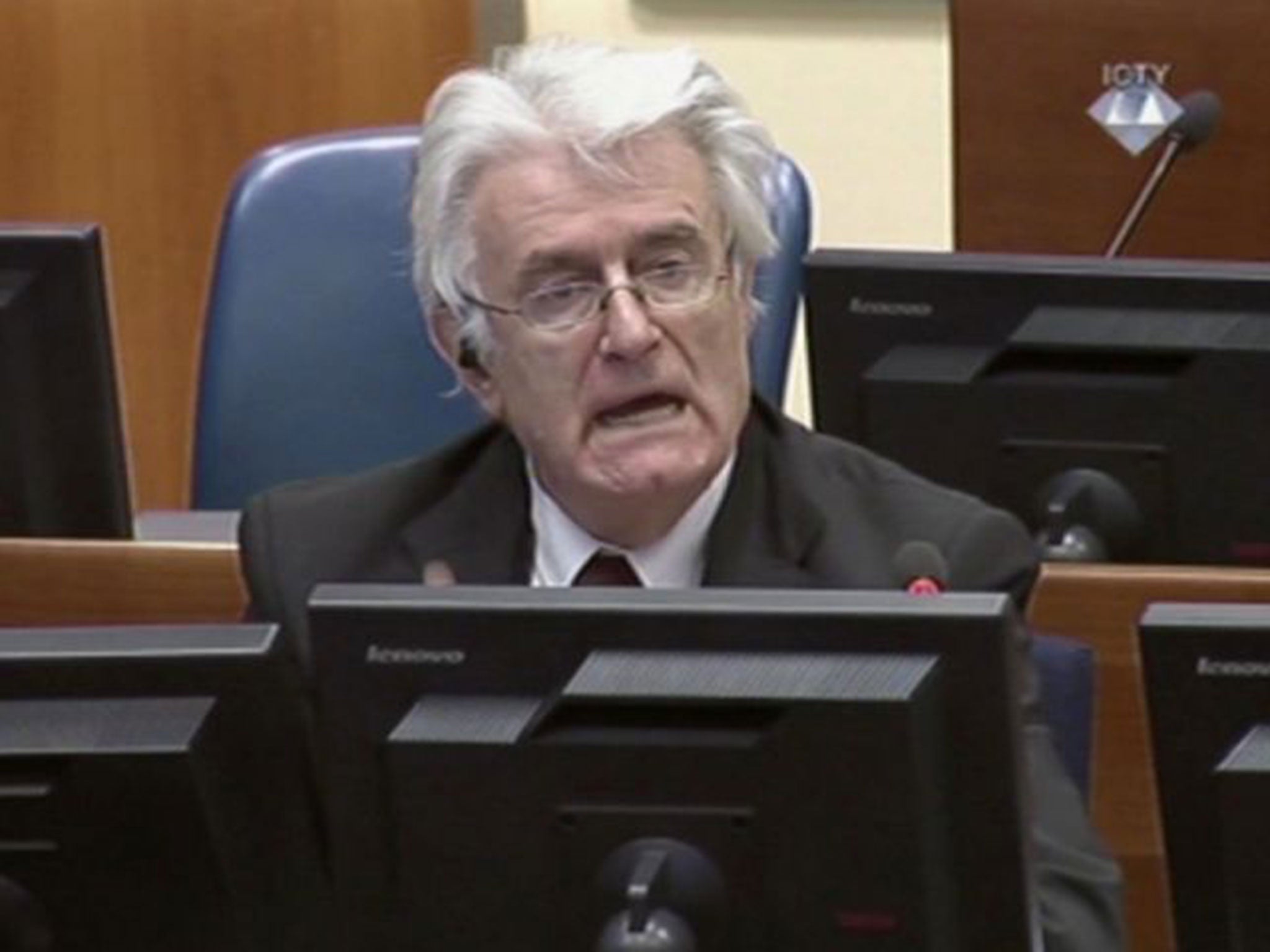Radovan Karadzic war crimes trial: There is no proof to link me to Bosnian Serb atrocities, claims former leader
Mr Karadzic accused prosecutors of building their case on 'allusions, random chit-chat and testimony by their own employees'

Radovan Karadzic’s defence against charges of atrocities ran to 874 pages. Today, facing the UN war crimes tribunal, the man charged with orchestrating a campaign of terror that led to the deaths of thousands was again defiant, claiming prosecutors did not have a “shred of evidence” linking him to crimes in the Bosnian war.
At The Hague, Mr Karadzic claimed prosecutors were putting the entire Serb people on trial, but he acknowledged that as wartime leader of the breakaway Serb entity in Bosnia, he bore “moral responsibility for any crimes committed by citizens and forces”.
Mr Karadzic is charged with crimes including genocide and persecution committed by Bosnian Serb forces during the 1992-95 war, which left 100,000 dead. Prosecutors say he should be sentenced to life. In court, the 69-year-old said his 11-count indictment was based on the contention that he was a key member of a criminal plot to rid Serb-dominated areas in Bosnia of Muslims and Croats. Without that theory, he told judges: “The only thing that would remain would be my good deeds toward my people and the other two peoples.”
Mr Karadzic withdrew from public life after the war and later went into hiding. He was arrested in 2008 in the Serbian capital, Belgrade, disguised as a new-age healer. His trial began in 2009. Prosecutors concluded their case against him on Monday, calling him the “driving force” in the genocidal campaign to rid Bosnia of its non-Serbian population.
Alan Tieger, prosecuting, said Mr Karadzic had boasted at the time of his intentions to wipe out the non-Serb population. “After hundreds of witnesses, 80,000 pages of transcripts, and 10,000 exhibits, the policy of ethnic cleansing is finally exposed. And Karadzic was its driving force,” Mr Tieger said. “[There were] thousands killed, hundreds of towns destroyed, masses forcibly displaced.”
Mr Tieger gave examples of three people for whose deaths Mr Karadzic bore responsibility – a father killed in the Srebrenica massacre, a mother killed in the shelling of a Sarajevo marketplace, and a doctor shot in the Omarska prison camp. “Despite the knowledge of their death awaiting, many of the men were so thirsty that they were screaming ‘Give us water and then kill us’. They were ordered off the trucks five at a time, ordered to lie down and then shot,” Mr Tieger said, describing one massacre.
In his written arguments, Mr Karadzic said he was unaware at the time of the slaughter of Muslim men and boys at Srebrenica in 1995 – the worst massacre in Europe since the Second World War. He said evidence at his trial called into question the number killed there – widely accepted as more than 8,000 – and whether the slayings constituted genocide.
He accused prosecutors of building their case on “allusions, random chit-chat [and] testimony by their own employees”. Suggesting that prosecutors were trying not only him but all Bosnian Serbs, Mr Karadzic said: “If I am crazy, are a million and a half crazy who let their only sons go into freezing trenches to defend their homes and families for three years?”
Relatives of the war’s victims watching in the public gallery this week have said the crimes described were the tip of the iceberg. “I think that even worse things happened than what the prosecutor told the court,” said Munira Subasic, president of the Mothers of Srebrenica victims group.
Mr Karadzic is one of four suspects, including the Bosnian Serb military commander Ratko Mladic, still in the dock. Just seven suspects have been sentenced to life. Slobodan Milosevic, the Serbian President at the time, died in 2006 before the end of his trial.
Mr Karadzic said he had been given a “guarantee” by the late Richard Holbrooke, who was then the US special envoy to the region, of immunity from prosecution in return for stepping down. That guarantee should count as a mitigating factor in any sentence he received, Mr Karadzic said. Mr Holbrooke, who died in 2010, had denied any such deal and the court never accepted the claim.
Charges were brought against Karadzic in 1995, shortly before the war’s end.
Subscribe to Independent Premium to bookmark this article
Want to bookmark your favourite articles and stories to read or reference later? Start your Independent Premium subscription today.

Join our commenting forum
Join thought-provoking conversations, follow other Independent readers and see their replies